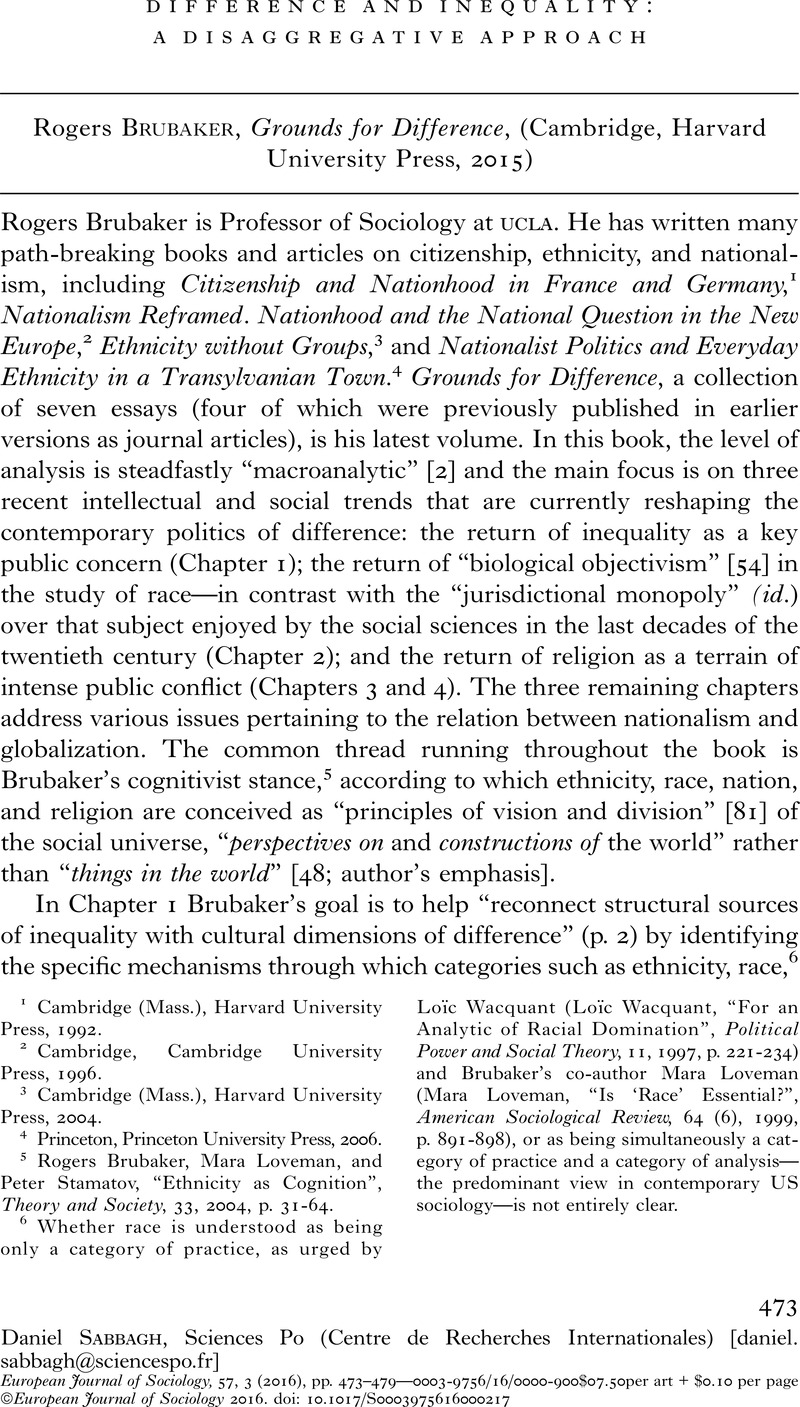No CrossRef data available.
Article contents
Difference and Inequality: A Disaggregative Approach - Rogers Brubaker, Grounds for Difference, (Cambridge, Harvard University Press, 2015)
Published online by Cambridge University Press: 17 January 2017
Abstract

- Type
- Book Reviews
- Information
- European Journal of Sociology / Archives Européennes de Sociologie , Volume 57 , Issue 3 , December 2016 , pp. 473 - 479
- Copyright
- Copyright © A.E.S. 2016
References
1 Cambridge (Mass.), Harvard University Press, 1992.
2 Cambridge, Cambridge University Press, 1996.
3 Cambridge (Mass.), Harvard University Press, 2004.
4 Princeton, Princeton University Press, 2006.
5 Rogers Brubaker, Mara Loveman, and Peter Stamatov, “Ethnicity as Cognition”, Theory and Society, 33, 2004, p. 31-64.
6 Whether race is understood as being only a category of practice, as urged by Loïc Wacquant (Loïc Wacquant, “For an Analytic of Racial Domination”, Political Power and Social Theory, 11, 1997, p. 221-234) and Brubaker’s co-author Mara Loveman (Mara Loveman, “Is ‘Race’ Essential?”, American Sociological Review, 64 (6), 1999, p. 891-898), or as being simultaneously a category of practice and a category of analysis—the predominant view in contemporary US sociology—is not entirely clear.
7 Charles Tilly, Durable Inequality, Berkeley, University of California Press, 1998.
8 Exploitation “operates when powerful, connected people command resources from which they draw significantly increasing returns by coordinating the effort of outsiders whom they exclude from the full value added by that effort” (id., p. 10).
9 Opportunity hoarding obtains “when members of a categorically bounded network acquire access to a resource that is valuable, renewable, subject to monopoly, supportive of network activities, and enhanced by the network’s modus operandi” and restrict access to that resource for outsiders (id., p. 91).
10 In this connection, see also Ayelet Schachar, The Birthright Lottery. Citizenship and Global Inequality, Cambridge (Mass.), Harvard University Press, 2009.
11 See generally Steven Epstein, Inclusion. The Politics of Difference in Medical Research (Chicago, University of Chicago Press, 2007), and Catherine Bliss, Race Decoded. The Genomic Fight for Social Justice (Stanford, Stanford University Press, 2012), two books on which Brubaker’s account relies in part.
12 A “national minority” is here understood as a “previously self-governing, territorially concentrated” cultural group whose territory has become incorporated into a larger state (see Will Kymlicka, Multicultural Citizenship. A Liberal Theory of Minority Rights, Oxford, Oxford University Press, 1995).
13 See, e.g., Gabriel Sheffer, Diaspora Politics. At Home Abroad, Cambridge, Cambridge University Press, 2003.
14 As noted on p. 179, the distinction between categories of analysis and categories of practice is drawn from the work of Pierre Bourdieu: see, e.g., Pierre Bourdieu, Language and Symbolic Power, Cambridge (Mass.), Harvard University Press, 1991. The main argument made in Chapter 6 has been mentioned above. Chapter 7 is a short essay on nationalism and modernity, which is not as illuminating as the rest of the book.
15 Edmund Phelps, “The Statistical Theory of Racism and Sexism”, American Economic Review, LXII (4), 1972, p. 659-661; Kenneth Arrow, “The Theory of Discrimination”, in Orley Ashenfelter and Albert Rees (eds), Discrimination in Labor Markets, Princeton, Princeton University Press, 1973, p. 3-33.
16 Peter Singer, “Is Racial Discrimination Arbitrary?”, Philosophia, 8 (2-3), 1978, p. 185-203; Mathias Risse and Richard Zeckhauser, “Racial Profiling”, Philosophy and Public Affairs, 32 (2), 2004, p. 131-170; Kasper Lippert-Rasmussen, “On Statistical Discrimination”, Journal of Political Philosophy, 15 (4), 2007, p. 385-403; “‘We are All Different’: Statistical Discrimination and the Right to be Treated as an Individual”, Journal of Ethics, 15, 2011, p. 47-59.
17 Frederick Schauer, Profiles, Probabilities, and Stereotypes, Cambridge (Mass.), Harvard University Press, 2003; Bernard Harcourt, Against Prediction. Profiling, Policing, and Punishing in an Actuarial Age, Chicago, University of Chicago Press, 2007.
18 Amanda K. Baumle and Mark Fossett, “Statistical Discrimination in Employment: Its Practice, Conceptualization, and Implications for Public Policy”, American Behavioral Scientist, 48 (9), 2005, p. 1250-1274.
19 For an introduction, see Mahzarin Banaji and Anthony Greenwald, Blindspot. Hidden Biases of Good People, New York, Delacorte Press, 2013.
20 Princeton, Princeton University Press, 2010.




